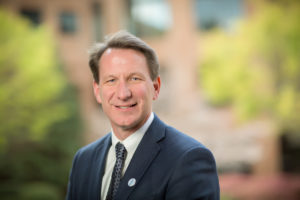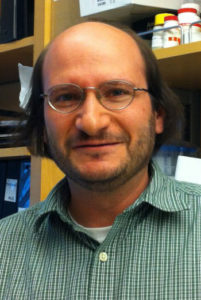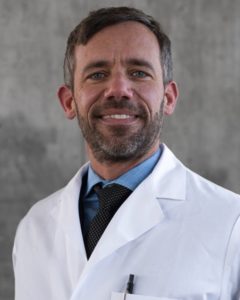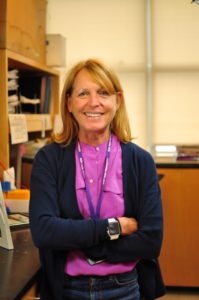DIRECTOR OF THE NCI: NED SHARPLESS, MD

Norman E. “Ned” Sharpless, M.D., was officially sworn in as the 15th director of the National Cancer Institute (NCI) on October 17, 2017. Prior to his appointment, Dr. Sharpless served as the director of the University of North Carolina (UNC) Lineberger Comprehensive Cancer Center, a position he held since January 2014.
Dr. Sharpless was a Morehead Scholar at UNC–Chapel Hill and received his undergraduate degree in mathematics. He went on to pursue his medical degree from the UNC School of Medicine, graduating with honors and distinction in 1993. He then completed his internal medicine residency at the Massachusetts General Hospital and a hematology/oncology fellowship at Dana-Farber/Partners Cancer Care, both of Harvard Medical School in Boston.
After 2 years on the faculty at Harvard Medical School, he joined the faculty of the UNC School of Medicine in the Departments of Medicine and Genetics in 2002. He became the Wellcome Professor of Cancer Research at UNC in 2012.
Dr. Sharpless is a member of the Association of American Physicians as well as the American Society for Clinical Investigation (ASCI), the nation’s oldest honor society for physician–scientists, and served on the ASCI council from 2011 to 2014. Dr. Sharpless was an associate editor of Aging Cell and deputy editor of the Journal of Clinical Investigation. He has authored more than 150 original scientific papers, reviews, and book chapters, and is an inventor on 10 patents. He cofounded two clinical-stage biotechnology companies: G1 Therapeutics and HealthSpan Diagnostics.
In addition to serving as Director of NCI, Dr. Sharpless continues his research in understanding the biology of the aging process that promotes the conversion of normal self-renewing cells into dysfunctional cancer cells. Dr. Sharpless has made seminal contributions to the understanding of the relationship between aging and cancer, and in the preclinical development of novel therapeutics for melanoma, lung cancer, and breast cancer.

Michael Bassik, PhD |
Dr. Michael Bassik is an Assistant Professor in the Department of Genetics at Stanford University. He performed his Ph.D work in Stanley Korsmeyer’s lab at Harvard, exploring the role of BCL-2 family proteins in regulating cell death. As a postdoc in Jonathan Weissman’s lab at UCSF, he helped to develop new high-coverage shRNA screening libraries and mammalian genetic interaction maps, applying these to study the biology of retrograde toxins. His laboratory at Stanford focuses on (1) development of shRNA and CRISPR/Cas9 systems for high-throughput screening by mutagenesis, single and pairwise gene perturbation, and (2) application of these technologies to study mechanisms of cellular uptake and identify novel drug target combinations in cancer. |

Fred Lang, MD |
Dr. Frederick F. Lang, MD, FACS, FAANS, FAAAS is currently Professor and Chairman in the Department of Neurosurgery at the University of Texas MD Anderson Cancer Center. He is also Adjunct Professor of Neurosurgery at Baylor College of Medicine, Houston, TX. He was born in New York, NY. He received his medical degree (1988) from Yale University School of Medicine, New Haven, CT. He completed a residency in neurosurgery (1995) at New York University Medical Center, and a fellowship in neurosurgical oncology (1996) at The University of Texas MD Anderson Cancer Center in Houston, TX. Dr. Lang is the recipient of numerous awards and honors, including the Preuss Research Award, the Mahaley Award, Journal of Neuro-Oncology Award, the Michael S. Voynick Award in Neuro-Oncology, the Perlman Lectureship, the Otto Lein da Wong Lecture from the Chinese University of Hong Kong, and the Abhijit Guha Award. He is the Principal Investigator of the multi-disciplinary SPORE in Brain Cancer Program grant. He is a NIH-funded translational researcher who has published extensively on gene, viral and cellular therapies for brain tumors and is PI on multiple clinical trial investigations that investigate these new approaches. He served on the Executive Committee of the AANS/CNS Section on Tumors as Secretary/Treasurer (2009-2011) and the Chairman (2011-2013). He served as a member of the Board of Directors of the Society for Neuro-Oncology, and is a past President of SNO, having completed his term as President in 2011. He is board certified in Neurosurgery and is a Fellow of the American College of Surgeons and the American Association of Neurological Surgeons, and the American Association for the Advancement of Science. He served on the Developmental Therapeutic Study Section within the NIH, he has continued as an ad hoc reviewer for NIH. He is frequently requested as a national and international lecturer. He has published more than 200 peer-reviewed articles and book chapters.
|

Mikael Pittet, PhD |
Dr. Mikael Pittet is Associate Professor at Harvard Medical School and Director of the Cancer Immunology Program at the MGH Center for Systems Biology. He completed his PhD at the Ludwig Institute for Cancer Research in Lausanne, Switzerland in 2001 and trained as a postdoctoral fellow at MGH, Dana Farber Cancer Institute and Harvard Medical School in Boston, USA. His research focuses on uncovering how various immune cells, including cytotoxic T cells, regulatory T cells, macrophages, neutrophils and dendritic cells, control cancer and other diseases and how these cells can be harnessed for therapy. His work combines several approaches, including in vivo imaging, to track immune cells and drugs directly in vivo. Pittet is a member of the American Association for Cancer Research and of the Dana-Farber/Harvard Cancer Center.
|

Jane Skok, PhD |
Dr. Jane Skok currently serves as Program Director of the Cancer Genome Dynamics Program at NYU Perlmutter Cancer Center. Dr. Skok’s work has focused on the role of nuclear organization in controlling programmed recombination and developmental processes in lymphocytes. Her laboratory applies a combination of sophisticated imaging techniques, molecular biology, genetics, and immunology to investigate the contribution of nuclear organization and long-range interactions in coordinating transcriptional programs, recombinational events and the maintenance of genome stability in developing lymphocytes. Hers is one of a handful of labs that has expertise in both the experimental (at the single cell and population level) and analytical aspects of chromosome folding. Dr Skok has worked for over a decade to identify the molecular mechanisms regulating lymphocytic development and transformation, with a focus on regulation of genomic integrity, gene transcription, epigenetic response and 3D chromosomal topology.
|
